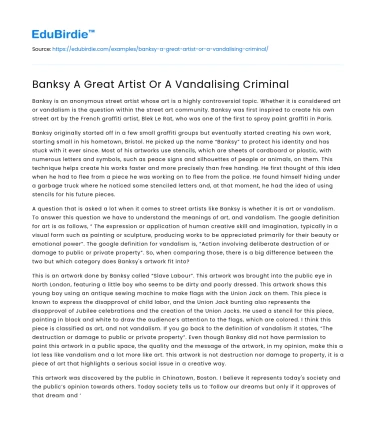Banksy is an anonymous street artist whose art is a highly controversial topic. Whether it is considered art or vandalism is the question within the street art community. Banksy was first inspired to create his own street art by the French graffiti artist, Blek Le Rat, who was one of the first to spray paint graffiti in Paris.
Banksy originally started off in a few small graffiti groups but eventually started creating his own work, starting small in his hometown, Bristol. He picked up the name “Banksy” to protect his identity and has stuck with it ever since. Most of his artworks use stencils, which are sheets of cardboard or plastic, with numerous letters and symbols, such as peace signs and silhouettes of people or animals, on them. This technique helps create his works faster and more precisely than free handing. He first thought of this idea when he had to flee from a piece he was working on to flee from the police. He found himself hiding under a garbage truck where he noticed some stenciled letters and, at that moment, he had the idea of using stencils for his future pieces.
Save your time!
We can take care of your essay
- Proper editing and formatting
- Free revision, title page, and bibliography
- Flexible prices and money-back guarantee
A question that is asked a lot when it comes to street artists like Banksy is whether it is art or vandalism. To answer this question we have to understand the meanings of art, and vandalism. The google definition for art is as follows, “ The expression or application of human creative skill and imagination, typically in a visual form such as painting or sculpture, producing works to be appreciated primarily for their beauty or emotional power”. The google definition for vandalism is, “Action involving deliberate destruction of or damage to public or private property”. So, when comparing those, there is a big difference between the two but which category does Banksy's artwork fit into?
This is an artwork done by Banksy called “Slave Labour”. This artwork was brought into the public eye in North London, featuring a little boy who seems to be dirty and poorly dressed. This artwork shows this young boy using an antique sewing machine to make flags with the Union Jack on them. This piece is known to express the disapproval of child labor, and the Union Jack bunting also represents the disapproval of Jubilee celebrations and the creation of the Union Jacks. He used a stencil for this piece, painting in black and white to draw the audience’s attention to the flags, which are colored. I think this piece is classified as art, and not vandalism. If you go back to the definition of vandalism it states, “The destruction or damage to public or private property”. Even though Banksy did not have permission to paint this artwork in a public space, the quality and the message of the artwork, in my opinion, make this a lot less like vandalism and a lot more like art. This artwork is not destruction nor damage to property, it is a piece of art that highlights a serious social issue in a creative way.
This artwork was discovered by the public in Chinatown, Boston. I believe it represents today's society and the public’s opinion towards others. Today society tells us to ‘follow our dreams but only if it approves of that dream and ‘be yourself’ but only if it's the you that they want you to be. This artwork is a mockery of these modern societal views. This artwork also takes part in the political and economic environment as the man in the painting is portrayed to be a lower- middle-classed man who looks to be suffering from an economic crisis, which is shown through his unsatisfied expression.
I believe that Banksy is an artist and not a vandal. His artworks are made to spread awareness of serious global and local issues. He doesn’t spray paint buildings to damage property, he sprays paints them to reach the public eye through humor or aggravation. Clearly, Banksy has a strong social conscience in the way he shares his opinions on how society works and he clearly wants the public to be challenged by the views he introduces and expresses through his works.






 Stuck on your essay?
Stuck on your essay?

